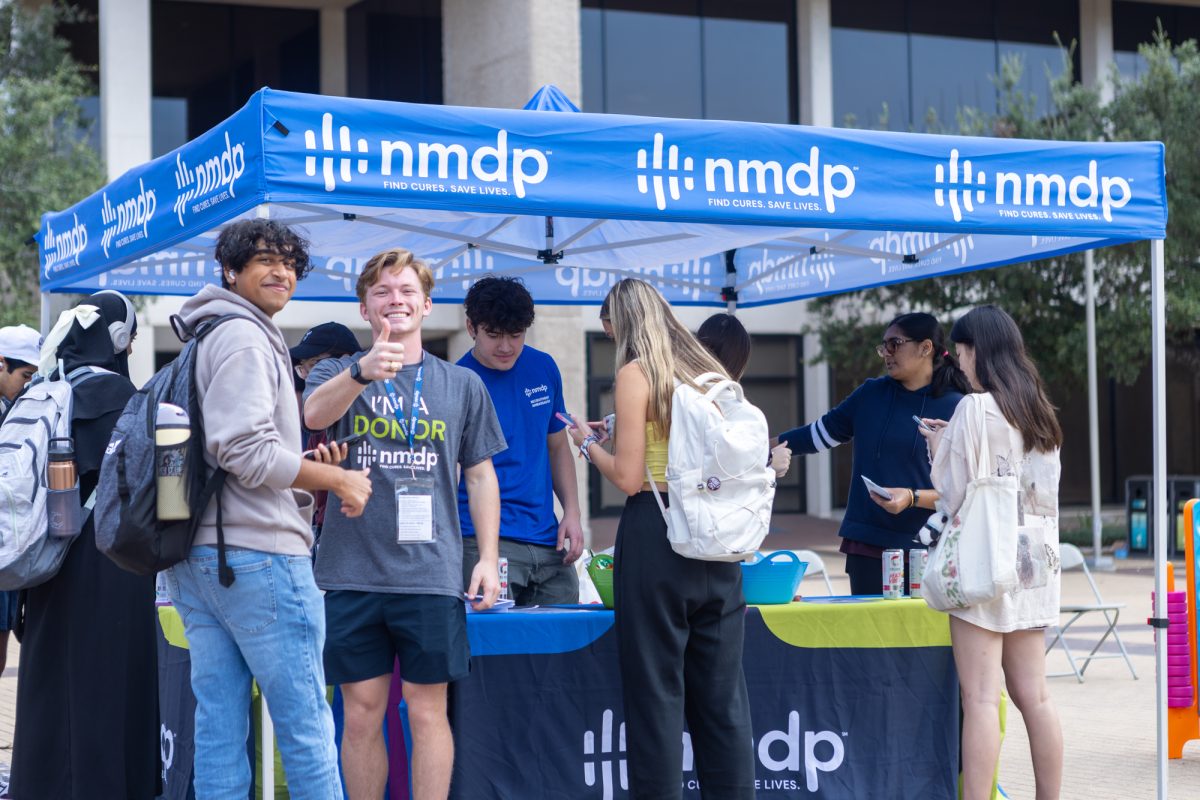Aggies respond to new tech to treat depression, anxiety
According to The Healthy Mind Network’s 2023 nationwide data on depression in college students, of the 96,000 college students who responded, 40.8%, or roughly 39,000 students, reported experiencing symptoms of depression.
While Texas A&M offers a variety of mental health resources including on-campus counseling services, a 24-hour helpline, the TELUS student support app and group workshops, there are new technologies under development including an Apple watch app for anxiety and a brain implant designed to address treatment-resistant depression.
Aggies were asked about the new tech approaches to coping with anxiety and depression, as well as awareness of existing campus resources.
Rice University is developing a brain implant designed for people who struggle with treatment-resistant depression, as reported in a Jan. 26 article in the Houston Chronicle. According to the National Center for Biotechnology Information, up to 30% of cases of clinical depression are classified as treatment-resistant, meaning they do not respond to prescriptions or cognitive behavioral therapy.
Communication sophomore Tyler Escue said he might consider the implant if it were a last resort.
“I personally never had depression, so I don’t know, but I think if all else fails, potentially I would be okay with it,” Escue said, “It would not be a first resort.”
Sport management freshman Taurean York said he would not approve of using a medical device implant to treat depression.
“Yeah, I don’t know about a brain implant, I don’t think I would do that,” York said. “I think it depends on who you are, but for me, I think I would pass on that.”
A&M engineering researchers are currently developing a project called mHELP, a feature for the Apple Watch that will identify anxiety, according to a recent Texas A&M Today article. The app is able to detect irregular heartbeat, which will then alert the student’s phone, leading them to an exercise that will help calm anxiety.
Accounting sophomore Alexia Garza said mHELP would be useful for students who need immediate relief.
“I like that the watch can detect all of that,” Garcia said. “I like that it can regulate your heartbeat or if you are really stressed out and on the verge of a panic attack you can take the steps necessary to avoid that.”
According to the Federal Trade Commission, many health apps may use sensitive information for their research, target users with advertisements or sell users’ information to other companies. Unlike a doctor, health apps may not be under privacy laws like HIPAA.
Finance senior Ryan Cegielski said he was open to the idea of apps that tracked health if they worked.
“I haven’t had experience with it so I wouldn’t know until it happened to me,” Cegielski said. “But I probably would, if it was something that would work.”
Isabella Diebolt, a public health senior, said even though these types of devices are selling user data, she would still use them if they improved her mental health.
“In this world today, everything I’m putting [online] is gonna be seen by someone,” Diebolt said. “If it is helping me, then it is helping me. If anything, I want people to know and see how it’s helped me in this way.”
National data estimates 40% of college students experience depression or anxiety, while 12% would be expected to report treatment-resistant depression based on research. With A&M’s 2023-24 academic enrollment of around 77,000 students, around 9,240 students would be expected to be experiencing treatment-resistant depression based on national statistics.
Diebolt noted she has had mental health struggles.
“If my antidepressants didn’t work, I definitely would consider [the implant],” Diebolt said. “Depression affects literally every thought you have, like everything you think about and it’s just a trickle effect into every aspect of your life, so if nothing else is working or really helping then I would definitely consider doing [the implant].”
In a 2020 survey, the National Library of Medicine noted that 40 to 60 people out of 100 who took antidepressants noticed an improvement in their depression symptoms within six to eight weeks.
Cole Baxter, Class of 2021, said he thinks the implant is a way for people to make money and will possibly cause people to “lose their humanity.”
“This thing is designed to treat mental health diseases — whatever they may be — but so were the pharmaceuticals,” Baxter said. “Antidepressants and stuff, if they are not completely ineffective, then they are essentially poison because they cause a lot of the psychological breaks that you see in young people.”
Common side effects of antidepressants in adolescents in a 2021 study by Baylor University Medical Center Proceedings included nausea, dizziness and insomnia, but there are some rare side effects including psychosis, hypertension and skin symptoms.
Cegielski said he has seen changes in his family who struggled with treatment-resistant depression but found alternative treatments to help them.
“I believe there are other ways to cure [mental health issues], but to be honest I do not really believe in the medicine either because I think they are just trying to get you hooked on it,” Cegielski said. “I feel like there are so many different ways, such as changing your food, because I’ve had people in my family change without medicine or doctors.”
Baxter said he would not trust technology or an implant to treat mental health issues and he predicted that since these device diagnoses are based solely on physiologic changes, it will not end up helping people.
“There are so many things that can increase your heart rate or make you jump,” Baxter said. “It doesn’t have to be anxiety, and it doesn’t have to be depression. I think that’s going to backfire badly and it’s going to feed in people’s minds that they’re messed up when they’re actually not. As technology is concerned in helping mental health, try cat videos or music.”
Escue said he thought A&M resources were helpful.
“I think they do a good job,” Escue said. “I know during freshman year we had a class focused on specific mental health.”
Diebolt said she has dealt with depression and was familiar with A&M’s Counseling & Psychological Services.
“There’s advertising everywhere,” said Diebolt. “It’s like one of the first things you learn about being a freshman at A&M.”


















